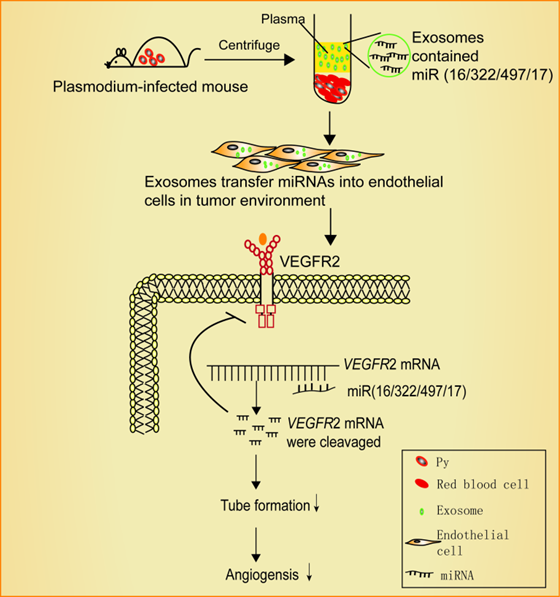2017年6月26日,国际学术权威刊物自然出版集团旗下子刊《Oncogenesis》杂志上在线发表了中国科学院广州生物医药与健康研究院陈小平课题组的最新研究成果“Exosomes from Plasmodium-infected hosts inhibit tumor angiogenesis in a murine Lewis lung cancer model”。研究首次发现疟原虫感染小鼠血浆外泌体(exosomes)能够抑制肿瘤血管生成,并初步阐明其分子机制。研究加深了对疟原虫感染宿主所分泌的外泌体与肿瘤血管生成之间的相互作用的认识,为开发疟原虫感染来源的外泌体作为一种新型抗肿瘤制剂奠定了基础。博士研究生杨一峻为论文第一作者,陈小平博士为论文通讯作者。
外泌体是细胞外膜泡,在细胞与细胞间通讯中起作用。在病原体感染宿主时,外泌体也发挥重要作用。但是,在上述论文发表之前,科学家们并不清楚疟原虫感染宿主所产生的外泌体是否能够抑制肿瘤血管生成,更不知道其中的分子机制。
研究人员选用肺癌小鼠模型作为研究对象,从感染疟原虫的小鼠血浆中获得外泌体,并将这些外泌体注射到小鼠的肿瘤内部,并与没有疟原虫感染的小鼠血浆外泌体进行对照。研究发现,疟原虫感染小鼠的血浆外泌体显著抑制肿瘤血管的生成。进一步的研究发现,疟原虫感染的小鼠血浆外泌体通过至少四种特殊的微小RNA(miR16-5p/17-5p/322-5p/497-5p)抑制血管内皮细胞 VEGF受体(VEGFR2)的 表达从而阻断血管生成的信号通路。这些发现加深了人们对疟原虫抗癌机理的理解,并为疟原虫疗法治疗癌症的临床研究提供进一步的理论依据。


疟原虫感染小鼠血浆外泌体抑制肿瘤血管生成的分子机制
原文链接:
原文摘要:
Previous research to investigate the interaction between malaria infection and tumor progression has revealed that malaria infection can potentiate host immune response against tumor in tumor-bearing mice. Exosomes may play key roles in disseminating pathogenic host-derived molecules during infection because several studies have shown the involvement and roles of extracellular vesicles in cell–cell communication. However, the role of exosomes generated during Plasmodium infection in tumor growth, progression and angiogenesis has not been studied either in animals or in the clinics. To test this hypothesis, we designed an animal model to generate and isolate exosomes from mice which were subsequently used to treat the tumor. Intra-tumor injection of exosomes derived from the plasma of Plasmodium-infected mice provided significantly reduced Lewis lung cancer growth in mice. We further co-cultured the isolated exosomes with endothelial cells and observed significantly reduced expression of VEGFR2 and migration in the endothelial cells. Interestingly, high level of micro-RNA (miRNA) 16/322/497/17 was detected in the exosomes derived from the plasma of mice infected with Plasmodium compared with those from control mice. We observed that overexpression of the miRNA 16/322/497/17 in endothelial cell corresponded with decreased expression of VEGFR2, inhibition of angiogenesis and inhibition of the miRNA 16/322/497/17 significantly alleviated these effects. These data provide novel scientific evidence of the interaction between Plasmodium infection and lung cancer growth and angiogenesis.(生物谷Bioon.com)

尊敬的 先生/女士
您已注册成功,注册信息及注意事项已发到联系人及参会人邮箱,请注意查收。如未收到,请联系大会联系人。